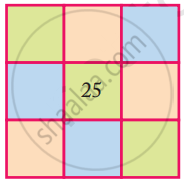Advertisements
Advertisements
Question
The sum of a two-digit number and the number obtained by reversing the digits is always divisible by ______.
Solution
The sum of a two-digit number and the number obtained by reversing the digits is always divisible by 11.
Explanation:
Let ab be any two-digit number, then the number obtained by reversing its digits is ba.
Now, ab + ba = (10a + b) + (10b + a)
= 11a + 11b
= 11(a + b)
Hence, ab + ba is always divisible by 11 and (a + b).
APPEARS IN
RELATED QUESTIONS
Which of the following statement is true?
If a number is divisible by 4, it must be divisible by 8.
Which of the following statement is true?
If a number is divisible by both 9 and 10, it must be divisible by 90.
Do you remember magic triangles? Come now, let s make some magic squares.
- Fill this square using all the numbers from 21 to 29.
Rule: The total of each side is 75.
Now you try and change these numbers into special numbers —
273
The difference of three-digit number and the number obtained by putting the digits in reverse order is always divisible by 9 and ______.
A number is divisible by 11 if the differences between the sum of digits at its odd places and that of digits at the even places is either 0 or divisible by ______.
If the digit 1 is placed after a 2-digit number whose tens is t and ones digit is u, the new number is ______.
A four-digit number abcd is divisible by 4 if ab is divisible by 4.
If a number a is divisible by b, then it must be divisible by each factor of b.
Find the value of k where 31k2 is divisible by 6.
